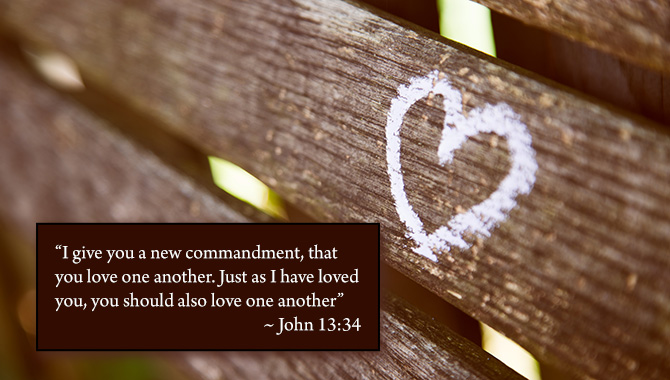For my thoughts are not your thoughts, nor are your ways my ways, says the Lord. ~ Isaiah 55:8
The Reverend Bill Cotton was the very first professor I had when I went to Course of Study to become a minister. He had been in ministry for over forty years in various United Methodist Churches across the Midwest. He was a salt of the earth kind of guy who spoke humbly, who did not feel a need to impose his views on anyone. His class was a safe place for us to ask questions without any fear of reprisal, and we loved him for that.
For our class, Reverend Cotton had us read, Soul Making: The Desert Way of Spirituality which presented a tradition of radical grace, love, and inclusion within the history of the Christian faith. The last line of Alan Jones’ book says, “Soul making is a matter of choosing the reality of love against which all other realities are tested as if by fire. The choice is ours.”
Jesus says, “I give you a new commandment, that you love one another. Just as I have loved you, you should also love one another” (John 13:34). It’s so simple yet so complex. How do we love our children, our parents, our neighbors, and our enemies? What does a way of life “grounded in love” (Ephesians 3:17) look like?
Reverend Cotton told us a story which I always fall back on. He and his wife left for the weekend to attend a church conference where he was going to be one of the featured speakers. His teenage daughter stayed home to attend school and care for their pets. She asked her parents, “Can I have a couple of friends over to spend the night?” “Sure, that’s fine. We trust you. Have a good weekend.” Nothing more was said.
After the conference, Bill and his wife drove home and as they were turning into their driveway, a police car was leaving. A keg of beer was on its side in the flower bed, empty plastic cups were strewn across the yard. Another keg was on the porch which was trashed out as well. Reverend Cotton parked his car and he and his wife ran inside to check on their daughter who was sitting all alone on the couch.
“Are you O.K.?” they asked. “Yes, I’m fine.” “Is everyone else, O.K.?” “Yes, a few of my friends got MIP’s (minor in possession of alcohol or drugs) and I got one as well.”
“What happened?” Bill asked his daughter. “I invited a couple of friends over and they invited a couple of friends and then it just grew and got out of hand. Then someone called the police.”
Most of us have probably been that kid or that parent, or we’ve been in a similar situation of judge or being judged? What do we do?
Rohr reports that when Pope Francis pronounced a “Year of Mercy” he said, “How much wrong we do to God and his grace when we speak of sins being punished by his judgment before we speak of their being forgiven by his mercy. We have to put mercy before judgment, and in any event, God’s judgment will always be in the light of his mercy” which is infinite.
“Grace is morally dangerous,” writes the Reverend Lewis Smedes. “To be accepted (and forgiven) whether or not we deserve to be accepted has always been an outrage to careful and rigid moralists.”
The men, the morally upright, the keepers of the law, want to stone to death the woman whom they caught committing adultery. They confront Jesus. “The law says we should stone her to death. What do you say?” (see John 8:5). “Let anyone among you who is without sin be the first to throw a stone at her.” One by one they lay their rocks down and walk away.
Are we in a position to judge? To punish? Can we hold ourselves and others responsible and be merciful at the same time?
Jesus tells the woman, “I do not condemn you. Go your way, and from now on do not sin again” (John 8:11). I always wonder how she responds to the grace extended to her. Maybe, a more important question is “how do we respond to the same grace given to us”?
Isaiah reflects on God, “My thoughts are not your thoughts, nor are your ways my ways” (Isaiah 55:8). “We think fear, anger, divine intimidation, threat, and punishment are going to lead people to love,” writes Rohr. We think if we just punish someone enough, they will be a good person, a good neighbor. It never works though.
The grace and love of God transforms us, not shame, guilt, and punishment.
Reverend Cotton and his wife sat down and had a rich, meaningful conversation with their daughter. They affirmed their love for her and talked about decisions and consequences. When done, he said, “Let’s clean this mess up.” And they did.
May grace transform our way of life and may we choose mercy before judgment. Amen.
Blessings and peace,
Craig

